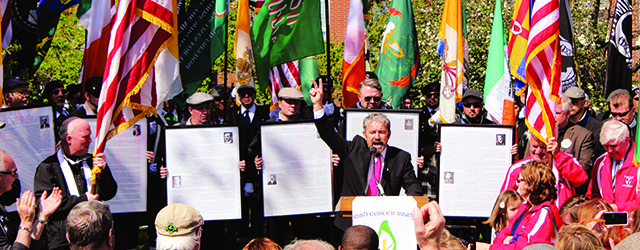By Brendan Clay
The crowd arrived early on Sunday, April 24 while the weather was still cool. They gathered around the Irish Memorial, a 12-foot high bronze sculpture depicting bedraggled Irish refugees from the great starvation of the 1840s and ’50s. The Civil War reenactors of the 69th Irish Brigade stood at attention while a pipe band practiced in a nearby parking lot and AOH color guard groups bantered with each other in the shadow of the sculpture, which depicts both a ship carrying Irish immigrants to America and a graveyard filled with mourners.
The crowd was there to participate in Philadelphia’s commemoration of the 100th anniversary of the Easter Rising of 1916. Philadelphia’s event coincided with celebrations across America honoring not just the heroes and revolutionaries of the 1916 rebellion, but all of the Irish victims of British imperialism, as well as those who stood against that imperialism throughout history, and — in the words of Patrick Pearse’s Proclamation of the Irish Republic — all of Ireland’s “exiled children.”
Keynote speaker and Tyrone native Patsy Kelly stepped in front of the podium to tell stories of Ireland’s past, of the indignities and violence the native Irish were subjected to by British rule, and he valorized the actions of those who resisted that rule, pointing out that many of these rebels had descendants in the audience and in the ceremony. And he spoke of the deliberate British policies that led to the starvation of Irish citizens.
“There are those in Ireland and especially here in the United States who will never utter the word famine,” said Kelly. “Because the word famine would suggest a lack of food or the absence of food, and of course neither of the latter applied to what happened in Ireland in 1845.”
After the ceremony at the memorial — which included raising the Irish tricolour and laying a wreath at the base of the memorial — the crowd proceeded to Independence Hall. It was a striking image. Pedestrians were surprised by the parade of pipe bands and historical reenactors marching down Market Street and sightseers approached them to take selfies.
For the most part the audience reacted as one united body throughout the morning’s events, but there were two points where dissension broke that spell. During his speech, Kelly criticized those who wait for Northern independence “to show up underneath a Christmas tree with a wee red, white and blue ribbon on it,” and someone in the crowd yelled “It won’t come in a gun either.” Later at Independence Hall, another person yelled “The United States is an imperialist nation,” and was met with audible disapproval by the crowd.
A high point of the ceremony was Temple University professor Dr. Brian O’Murchu’s Irish-language reading of the Proclamation of the Irish Republic in front of Independence Hall, and he prefaced it with a story of his own family history.
“I had one grandfather who was in a trench in Flanders fighting for the British army because he had no other job to go to because his country lacked sovereignty,” said O’Murchu. “I had another grandfather two, three years later, when he got old enough take his britches off, disappeared off with the nationalist forces fighting Britain that lead to independence in 1921.”
“It’s important to understand that the British Empire began to collapse in 1776 as a result of what happened directly behind us,” O’Murchu continued, “However the second country to exit the British Empire was Ireland.”
It was a beautiful thing to conclude the tribute to the latest event of the fight for Ireland’s independence at the place where our American independence was born.
Irish Easter Rising Centennial Commemoration
At the Irish Memorial and Independence Hall
[metaslider id=2134]
Photos by Brendan Clay and Tom Keenan

